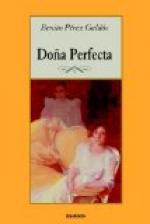The Penitentiary was very fond of the parrot. When he left Dona Perfecta and Rosario conversing with the traveller, he went over to the bird, and, allowing it to bite his forefinger with the greatest good humor, said to it:
“Rascal, knave, why don’t you talk? You would be of little account if you weren’t a prater. The world of birds, as well as men, is full of praters.”
Then, with his own venerable hand, he took some peas from the dish beside him, and gave them to the bird to eat. The parrot began to call to the maid, asking her for some chocolate, and its words diverted the two ladies and the young man from a conversation which could not have been very engrossing.
CHAPTER VI
IN WHICH IT IS SEEN THAT DISAGREEMENT MAY ARISE WHEN LEAST EXPECTED
Suddenly Don Cayetano Polentinos, Dona Perfecta’s brother-in-law, appeared at the door, and entering the room with outstretched arms, cried:
“Let me embrace you, my dear Don Jose.”
They embraced each other cordially. Don Cayetano and Pepe were already acquainted with each other, for the eminent scholar and bibliophile was in the habit of making a trip to Madrid whenever an executor’s sale of the stock of some dealer in old books was advertised. Don Cayetano was tall and thin, of middle age, although constant study or ill-health had given him a worn appearance; he expressed himself with a refined correctness which became him admirably, and he was affectionate and amiable in his manners, at times to excess. With respect to his vast learning, what can be said but that he was a real prodigy? In Madrid his name was always mentioned with respect, and if Don Cayetano had lived in the capital, he could not have escaped becoming a member, in spite of his modesty, of every academy in it, past, present, and to come. But he was fond of quiet and retirement, and the place which vanity occupies in the souls of others, a pure passion for books, a love of solitary and secluded study, without any other aim or incentive than the books and the study themselves, occupied in his.
He had formed in Orbajosa one of the finest libraries that is to be found in all Spain, and among his books he passed long hours of the day and of the night, compiling, classifying, taking notes, and selecting various sorts of precious information, or composing, perhaps, some hitherto unheard-of and undreamed-of work, worthy of so great a mind. His habits were patriarchal; he ate little, drank less, and his only dissipations consisted of a luncheon in the Alamillos on very great occasions, and daily walks to a place called Mundogrande, where were often disinterred from the accumulated dust of twenty centuries, medals, bits of architecture, and occasionally an amphora or cubicularia of inestimable value.
Don Cayetano and Dona Perfecta lived in such perfect harmony that the peace of Paradise was not to be compared to it. They never disagreed. It is true that Don Cayetano never interfered in the affairs of the house nor Dona Perfecta in those of the library, except to have it swept and dusted every Saturday, regarding with religious respect the books and papers that were in use on the table or anywhere else in the room.




